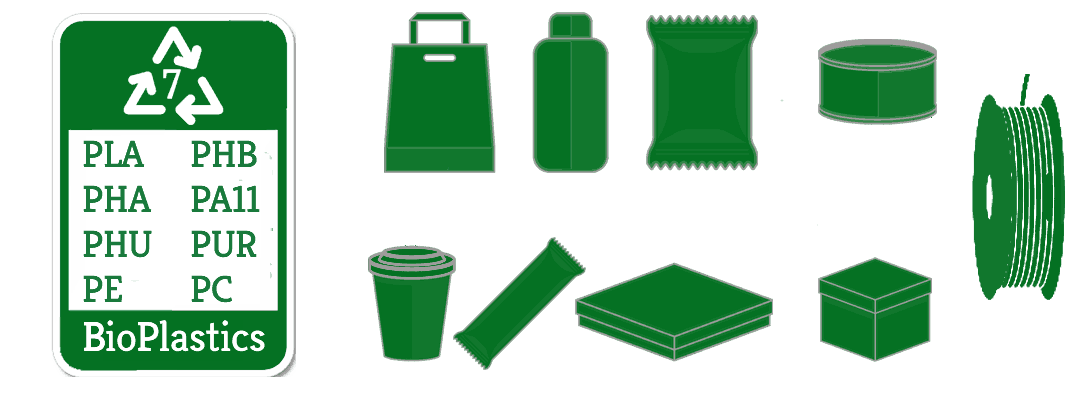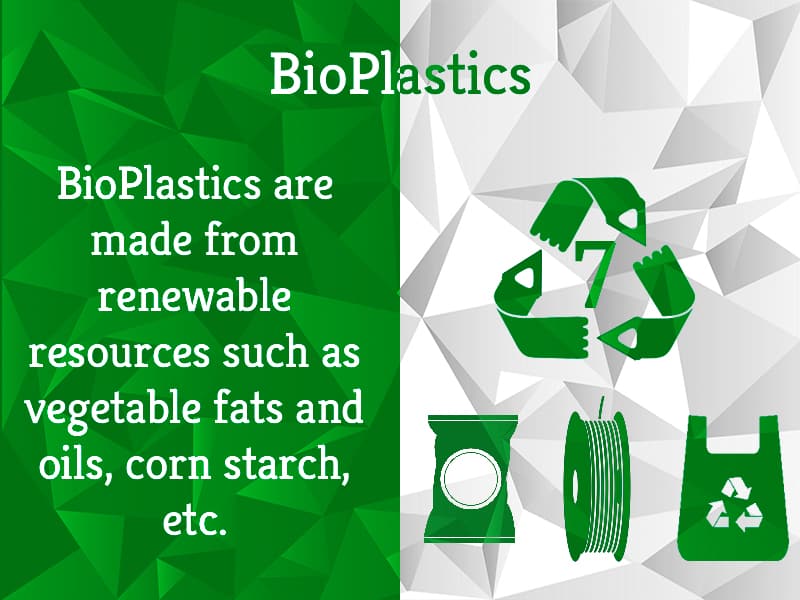Most BioPlastics take approximately 3 to 6 months to decompose fully.

These polymers are derived from renewable sources like:
- Vegetable Oils
- Vegetable Fats
- Corn Starch
- Microbiota
- Agricultural By-Products (using micro-organism)
- Plastic Bottles (using micro-organisms)
- Plastic Containers (using micro-organisms)
Different types biomass sources give different types of Bioplastics such as :
- Bio-based Polyethylene Terephthalate (PET) – Made from Sugarcane Feedstock
- Bio-based Polyethylene (PE) – Made from Sugarcane Feedstock
- Bio-based Polycarbonate (PC) – Made from Corn Feedstock
- Bio-based Polyamide (PA 4, 10/PA 6,10) – Made from Caster Oil Feedstock
- Bio-based Polyurethane (PUR) – Made from Feedstock of Corn, Sugarcane, Tapioca
- Bio-based Polyamide (PA 11) – Derived from Natural Oil
- Bio-based Polyhydroxyalkanoates (PHA) – Made by fermentation of Sugar or Lipids
- Bio-based Poly-3-hydroxybutyrate (PHB) – Derived from corn starch, glucose or waste-water
- Bio-based Polyactic acid (PLA) – Derived from Corn or Dextrose
To use the term Bioplastics generically is misleading. Mainly because it suggests:
- That all polymers derived from the biomass are biodegradable plastics.
- That any polymers derived from the biomass are environmentally friendly.
The current application of these bio-based polymers or bioplastics are limited. They are currently use for making:
- Disposable Items
- Carry Bags
- Trays
- Fruits & Vegetable Containers
- Egg Cartons
- Packaging Materials (for food)
- Bottles (for soft drinks & dairy products)
- Cutlery, Bowls, Pots, Straws, etc.
- Non-Disposable Items
- Insulations
- Plastic Piping
- Mobile Phone Casings
- Carpet Fibers
- 3D Printing Filaments
- Medical Items
- Medical Implants
Environmental Impact
One of the most debatable topics regarding bioplastics is about their environmental impact. In contrast to most popular belief not all bio-based polymers, generically referred to as bioplastics, are biodegradable. Broadly all bioplastics can be classified into two categories:
- Durable : Polymers that are derived from renewable sources of biomass but not easily biodegradable.
- Biodegradable : Polymers that are derived from renewable sources of biomass and also biodegradable.
When a bioplastic product is composted, the bio-based polymer can no longer be recycled. This means all of the energy and material is lost in the soil. Composting of biodegradable bioplastics may only make sense in cases where large volumes of organic landfills are utilized for methane generation (also known as Biomethanation).
On the other hand, durable bioplastics provide an opportunity to migrate the dependancy on petro-based plastics. Durable BioPlastics can be easily recycled and reused. They can also be recycled along with petro-based plastics like PET Plastics. This way all the valuable energy and material inputs can be kept in the production cycle longer.
Key Challenges faced by BioPlastics:
- To realistically offset dependency on petro-based plastics, the overall demand for plastics needs to decrease.
- If the demand of plastics cannot be decreased, there will be significant increase in the demand for renewable sources of biomass such as corn and sugarcane and other agricultural byproducts. This in turn would cause unbalance in food production across the world.

